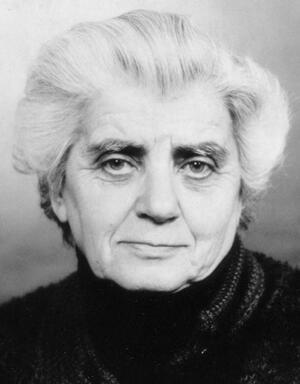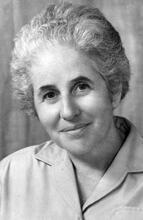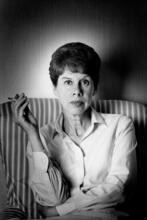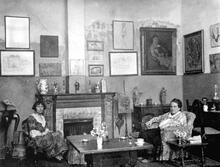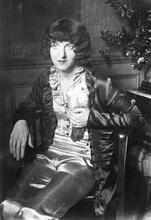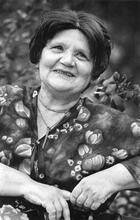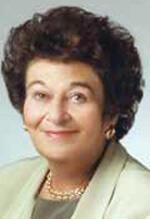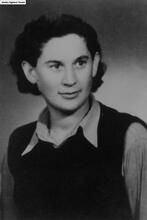Karen Gershon
As a young girl, Karen Gershon (1923 – 1993) was sent from Nazi Germany to England on the Kindertransport. As an adult, she documented the trauma this experience engendered for herself and her fellow child refugees in We Came as Children: A Collective Autobiography (1966), which sparked extensive comment and established her literary reputation in England.
Institution: Naomi Shmuel.
After Kristallnacht, Karen Gershon and her sisters were sent to England with the Kindertransport, where she worked at odd jobs until her marriage in 1948. It took several years for Gershon to master the English language and begin writing poems in English, but her works immediately won the attention of critics and were published in prestigious literary supplements and major periodicals. Her first poetry collection, The Relentless Year, was published in 1959, and her best-known book, We Came as Children (1966), documenting the collective experiences of refugee children, established her literary reputation in England. After the Six Day War, Gershon lived in Israel with her family for several years. Moving back to England, Gershon continued to write, and in 1990 a television film was made about her life and her visit to the city of her birth in Germany.
Early Life
Poet Karen Gershon was born Kaethe Löwenthal, the youngest of three daughters of middle-class parents in Bielefeld, Germany, in 1923. Her sister Anne was born in 1921 and Lise in 1922. Her father, Paul Gershon-Löwenthal (b. 1890), an architect, served in the German army for many years and considered himself a German citizen for all intents and purposes. His wife, Selma (née Schönfeld, b. 1893), came from a traditional Jewish family. Karen’s maternal grandfather, Adolf Schönfeld, was head of the Jewish community of Bielefeld and the first of its members to be murdered by the Nazis.
The Löwenthals maintained a tenuous attachment to the Jewish religion and the Land of Israel. After the Nazis rose to power, Karen’s parents made sure that she studied Hebrew and prepared herself to relocate to Palestine through the Youth Lit. "ascent." A "calling up" to the Torah during its reading in the synagogue.Aliyah Movement. From the age of thirteen, this sensitive young girl wrote poems in German, a language her mother once called “the language in which they curse us Jews.”
After the pogrom of November 9 and 10, 1938 (“Kristallnacht”), burning of synagogues and a wave of attacks on Jews, Karen Gershon and her sisters were sent to England with the Kindertransport. Lise went on to Palestine in 1939, while Anne fell ill and died in Bristol in 1943. Separation from her parents, who were deported to Riga on December 13, 1941, along with overall privation, a sense of alienation and loneliness and difficulty integrating into British society, which was at the time valiantly fighting Germany, affected young Karen and strengthened her character. Later, she documented the collective experiences of the refugee children in her best-known book, We Came as Children (1966), which sparked extensive comment and established her literary reputation in England. Her second documentary work, Postscript (1969), describes the fate of German Jewish survivors.
Gershon had to work for a living and was thus unable to complete her studies. To maintain a roof over her head, she worked as a housemaid, in a flour mill, as a chorus girl and at all kinds of odd jobs until 1948 when she married Val Tripp, a primary school arts and crafts teacher. It took several years for Karen to master the English language and begin writing poems in English.
Writing Career and Life in Israel
These poems, which addressed the experiences of the young immigrants and their attempts at rebuilding their lives, immediately won the attention of critics and were published in prestigious literary supplements and major periodicals. The first collection of her poems, The Relentless Year, was published in 1959.
Bearing the mark of a German syntactic and tonic influence on her English text, her poems reflect Gershon’s severance from her birthplace and mother tongue and her adoption of the language of England, the country that saved her life. However, the fact that she chose to write under her father’s name, Gershon, a variant on the Hebrew for “a stranger there,” indicates her continued sense of alienation.
The Israeli chapter of Karen Gershon’s life is part of a biographically and linguistically tragic Jewish odyssey. During the Six Day War, she feared the Arabs would destroy Israel and decided to live or die among her brethren, “to be there.” Her poetry expresses this deep emotional need to be present in Jerusalem:
Need to belong has made me come
to help rebuild Jerusalem,
where everyone is family—
all descendent from Abraham
and sharing one inheritance.
(From “I Set Out for Jerusalem,” Collected Poems, (1990)
Arriving in Israel after the Six Day War of 1967, together with her (non-Jewish) husband, Val Tripp, and four children (Chris, b. 1948; Tony, b. 1950; Stella, b. 1954 and Naomi, b. 1962), Gershon tried to become part of Israeli life, living in Jerusalem for several years before returning to England with her husband. She spoke Hebrew, which she remembered from the days of her youth and which she studied diligently at an ulpan and learned from her grandchildren, but she never attempted to write in this language. During her stay, several of her poems were translated into Hebrew and published in literary supplements. In 1970, a slim volume of the Jerusalem poems she wrote in Israel, entitled The Pulse in the Stone, appeared in English and then in a translation by poet Rachel Chalfi. Gershon attempted to absorb the landscapes of Jerusalem and of all Israel and to describe them in her poems. The title of the collection attests to her search for the essential lifeline inherent in the stones of the Western Wall and the stone houses of Jerusalem. The poet is aware of the monotheistic religions: “To have one faith means to struggle with those of other faiths,” she wrote in the poem “Holy Places.” She assesses wars with a critical eye and perceives the tragedy of mothers and their sons who fall in battle. Mourning reminds her that the “plague of Auschwitz” threatens Israel. Persecution of Jews, the ghettos and Auschwitz are mentioned several times in the collection, as for example in the poem Auschwitz in Israel, which closes with the words:
Death has sunk wells in us but life makes fountains
Transfusing residues into one nation.
(“Auschwitz in Israel,” from The Pulse in the Stone: Jerusalem Poems, 1970)
The ending is optimistic, but Karen Gershon does not end the poem with a period, as if to indicate that the process is still going on.
Unfortunately, the Israeli critics paid little attention to the publication, a fact that deeply disappointed and offended Gershon. Indeed, the poet had difficulty realizing her yearning to become part of Israel even though she had friends who reached out to her, including then-President Zalman Shazar, Shulamith Nardi and others. Her British husband could not accustom himself to the Israeli lifestyle and to the tense and crowded living conditions. He was also unable to find employment in his profession of art teacher. In 1973, he and Gershon returned to England, though some of their children remained in Israel. Stella, the third child, who had initially been the most enthusiastic of the immigrant family, was the first to return, in 1971, to attend art school. Karen Gershon saw this separation as a painful parallel to her own leaving of her parents.
Later Career in England
In England Gershon continued to write and publish. My Daughters, My Sisters and Other Poems, which appeared in 1975, was followed by a work of fiction, The Bread of Exile (1985), which has numerous autobiographical roots. The opening paragraph describes what was an ordinary winter morning for the Germans but a fateful day for two young Jews, Inga and Dolfi. Their mother made them their last breakfast, then combed their hair. She dressed them in mourning clothes because their grandmother, her mother, had committed suicide after her husband was arrested. Carrying cheap suitcases, the two made their way towards the railway station, walking in the road because Jews were not allowed to use the sidewalk or travel by streetcar. The platform is so crowded that the children lose sight of their parents and never get to say goodbye. Their father rushes towards the train as it proceeds into the distance—a traumatic scene that continued to haunt the poet as a young refugee.
Consolation may be found in children and grandchildren, in succeeding generations. Gershon drew encouragement and consolation from her children, whom she describes in her poems as a welcome reincarnation of her deceased family, stating this explicitly in the poem Generations. Stella, now an artist who resides in England, takes the place of her sister Anna, who fell ill and died in Bristol in 1943. She also wrote numerous poems inspired by her younger daughter Naomi, an anthropologist and writer married to Emanuel Shmuel, an immigrant from Ethiopia, who still lives in Israel.
Like a bell-clapper, Naomi
strikes grace-notes in my memory,
all my dead family
swarm in her Honey-hive.
Like her, my parents must
once have been glad to live.
(“Generations (1) The Distaff Side,” My Daughters My Sisters and Other Poems, 1975)
Gershon’s love poems to her husband Val and her poems for her children are delicate in texture. “Whom I love. With him I am at home.” She loves to touch her family and expresses emotional bliss as her tall husband holds their son in his arms. At that moment, she feels even closer to him than she did when they were first wed.
In the succinct Self-Portrait, the final poem in My Daughters, My Sisters and Other Poems, Karen Gershon refers to “the girl within,” an oblique and ironic response to those who see her only as a heavy-set, elderly woman and cannot imagine that a young girl could be found within her. She is tired of pretending. This sober and wise poem displays awareness both of the passage of time and of the source of the poem’s inspiration: Memories of childhood at her parents’ home in Bielefeld, a warm family hearth and amiable sisterly relations. All this was taken from her when she escaped with the Kindertransport to England. Karen Gershon’s severance and loss were the muses that inspired her to write.
Having begun with the “girl within,” we conclude with the older woman, free of youthful illusions. In one of her later poems, Distinction, Karen Gershon describes her fear of illness and death, differentiating between her doctors’ diagnoses and the illness that has taken root within her body, the illness she can feel and internalize. In the same poem, she talks about the “burning girl” she once was, expressing her disappointment at not having achieved what she really wanted in her life and works. In her own candid, forthright manner, she confesses:
With my crooked fingers I write:
I am not reconciled.
(“Prognosis,” Collected Poems, 1990)
A British televisionfilm, Strangers in a Strange Land (directed and produced by John Pett for Channel Four in 1990), presented Karen Gershon’s life and her visit to the city of her birth in Germany. In one of the most emotional parts of the film, her quintessentially British husband is quoted as wondering why Karen cannot free herself of guilt feelings and nightmares. “What’s past is past,” he claims. A person has to regain composure, to go forward and not look back. But Karen is determined that she must hang on to memories and give them a voice; she feels that she must not forget her dear ones who were slaughtered. Otherwise, who will ever remember that they lived?
Karen Gershon published several further collections of poems, printed in limited, as well as documentary works and novels, which won her a loyal readership and literary prizes, such as the Hayyim Greenberg Memorial Award in 1968. In 1990, her Collected Poems appeared.
Karen Gershon died in Cornwall in March 1993, following a heart bypass operation. Some ten years after her death, a collection of her final poems, Grace Notes, was published independently by her husband. Recently, scholars such as Peter Lawson have displayed renewed interest in her poetry. A conference on Jewish Women’s Writing of the 1990s and Beyond, held at the Johannes Gutenberg University in Mainz in 2003, featured lectures on her work, which is marked by a precise, intellectual formulation and original metaphors.
SELECTED WORKS BY KAREN GERSHON
Non-Fiction
We Came as Children (1966); Postscript (1969).
Fiction
The Bread of Exile (1985).
Poetry
The Relentless Years (1959).
My Daughters, My Sisters and Other Poems (1975).
Collected Poems (1990).
Grace Notes (2002).
Lassner, Phyllis. Anglo-Jewish Women Writing the Holocaust: Displaced Witnesses. Basingstoke: Palgrave Macmillan, 2008.
Shmuel, Naomi Anne. The Legacy of Karen Gershon: Child Survivor to Author and Poet. Newcastle-upon-Tyne: Cambridge Scholars Publishing, 2024.
Tylee, Claire M, ed. 'In the Open': Jewish Women Writers and British Culture. Newark, DE: University of Delaware Press, 2006.
Valman, Nadia. Jewish Women Writers in Britain. Detroit: Wayne State University Press, 2014.

